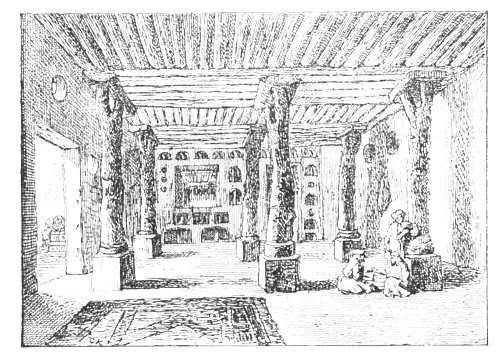

Be warned. This column is not amusing or exciting. Its subject is continuing tragedy.
When he was traveling around Mesopotamia in the 1840s, Austen Henry Layard encountered the Yezidis, an ancient sect of mysterious origins. Their neighbors referred to them as devil-worshippers, a misleading and unjust accusation. They were certainly not Satanists. However, the archangel they worshipped, and whose name they did not speak, was identified by their neighbors as Satan. As a result, they were always scorned and frequently attacked by their neighbors.
Layard himself found them to be an attractive and admirable group.

He was particularly impressed by the cleanliness of their villages—a marked contrast to what he had seen elsewhere. The sketch at left is his own drawing of a Yezidi house.
When he first visited, their chief was Hussein Bey, a youth of eighteen, the son of the previous chief who had died in the most recent massacre. That had occured when Hussein was an infant.
His tribe, the Yezidis of Sheikhan, had been living in the Sinjar region north of Mosul. They were attacked by Kurdish Moslems and slaughtered by the hundreds. Some tried to flee Mosul. Layard described their fate:
It was in spring; the river had overflowed its banks, and the bridge of boats had been removed. A few succeeded in crossing the stream ; but a vast crowd of men, women, and children were left upon the opposite side, and congregated on the great mound of Kouyunjik [the site of Nineveh]. The Bey of Rowandiz followed them. An indiscriminate slaughter ensued; and the people of Mosul beheld, from their terraces, the murder of these unfortunate fugitives, who cried to them in vain for help — for both Christians and Mussulmans rejoiced in the extermination of an odious and infidel sect, and no arm was lifted in their defence.
It was not a unique event in the history of the Yezidis. While the Moslems around them had some toleration for the Christians and Jews, who were considered People of the Book, there was no toleration for the Yezidis.
Yearly expeditions have been made by the governors of provinces into their districts; and, whilst the men and women were slaughtered without mercy, the children of both sexes were carried off, and exposed for sale in the principal towns. These annual hunts were one of the sources of revenue of Beder Khan Bey; and it was the custom of the Pashas of Baghdad and Mosul to let loose the irregular troops upon the ill-fated Yezidis, as an easy method of satisfying their demands for arrears of pay. This system was still practised to a certain extent within a very few months; and gave rise to atrocities scarcely equalled in the better known slave trade. It may be hoped that the humane and tolerant policy of the Sultan, which has already conferred such great and lasting benefits upon multitudes of his subjects, will be extended to this unfortunate sect.
That was a vain hope on Layard’s part. These are the same Yezidis (now often spelled Yazidis) who are now being targeted by ISIS and have been slaughtered by the thousand.
It is harrowing to see how many of the horrors of the past continue into the present.

Comments
Yezidis
That part of the world has always been entrenched in its own ruin and desecration. Add religious zeal to that and it is a wonder there is anyone left. Great post, Lil.
Thanks, Gwen. This part of
Thanks, Gwen. This part of Layard's book has been haunting me ever since I read it.
Disturbing
It's heartbreaking to hear how horrors of the past are repeated even today. I think of Salem and the witch hysteria and how the Puritans believed, without question, that if one among them sinned, that act allowed Satan into their space, which would, of course, be a threat to them all. They HAD to exterminate the sinner... or as mentioned in this post, the "infidel". It's horrifying to see it all justified in the name of religion, but then that's not a new concept, it's just one that keeps repeating itself. And the atrocities continue. So disturbing.
This is just brilliant. I
This is just brilliant. I wonder from where do you get this information. The source you have should be incredible to be able to provide this rare information. I am really loving reading each of your posts.
---------------------------------------
https://www.andersontrophy.com
hai
Massacres happen every day, all around the world. They happen in homes, in schools, in workplaces, in communities. They happen between individuals, between groups, between nations. They are a part of the human experience, and have been since the beginning of time. Despite their frequency, massacres continue to shock and horrify us. They remind us of our capacity for violence, and of the fragility of life. certified diamonds online shopping They force us to confront the darkest aspects of our nature.
Post new comment